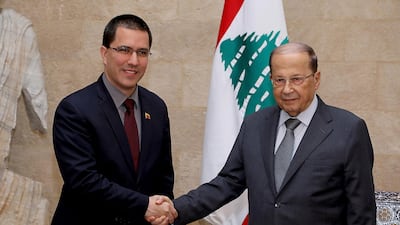Venezuelan Foreign Minister Jorge Arreaza, who is visiting Lebanon, denies US claims that his country harbours Hezbollah cells.
“He said that the US sometimes accuses Venezuela of having Hezbollah cells but that’s not true,” Lebanese MP Yassine Jaber said after meeting Mr Arreaza on Wednesday.
Mr Jaber, head of the foreign affairs committee in Parliament, replaced Speaker of Parliament Nabih Berri to meet Mr Arreaza.
US Secretary of State Mike Pompeo told Fox Business in early February that Hezbollah had active cells in Venezuela.
“The Iranians are impacting the people of Venezuela and throughout South America," Mr Pompeo said. "We have an obligation to take down that risk for America.”
The US considers Hezbollah to be a terrorist organisation.
Mr Jaber said that Mr Arreaza told him he had stopped in Lebanon as part of a tour to “put forward his case” and gather support for the administration of President Nicolas Maduro.
Venezuela entered a deep political crisis in January when leader of the opposition-controlled National Assembly, Juan Guaido, invoked the constitution to assume interim presidency after declaring Mr Maduro’s 2018 re-election a fraud.
Syria, Venezuela and the Iran-backed Lebanese party Hezbollah are all supported by Russia, which also backs the Maduro administration.
Hezbollah has also publicly expressed support for Mr Maduro and for his predecessor, Hugo Chavez.
But the US and most of the international community has recognised Mr Guaido, who was stripped of his parliamentary immunity on Tuesday, as interim president.
Mr Arreaza was due to meet Hezbollah leader Hassan Nasrallah to discuss the current political crisis in Venezuela. He also met President Michel Aoun and Foreign Minister Gebran Bassil on Wednesday.
Mr Jaber said that Mr Arreaza was open to talks with the US.
“He said there was a lot of pressure on Venezuela from the US but that eventually there will be dialogue,” Mr Jaber said.
“He also spoke of the possibility of new elections and trusts that support is big among the population, and that the opposition is not popular."
Mr Arreaza had expressed similar intentions in a meeting on Venezuela requested by the US at the UN Security Council in late January.
“It is our intention to establish communication and dialogue with the government of President Trump,” he said.
Mr Arreaza conveyed a message from Mr Maduro about the situation in Venezuela” to President Aoun but did not give details, the Lebanese state-run National News Agency reported.
A senior adviser to the Lebanese Foreign Ministry said that Mr Arreaza and Mr Jaber discussed only relations between their countries during their meeting.
"They talked about the Lebanese community in Venezuela, which houses 400,000 people of Lebanese descent," Antoine Constantine told The National. "What kind of political support could Lebanon give Venezuela anyway?"
Analysts say Mr Arreaza's visit to Lebanon is symbolically important.
“Venezuela has a tight relationship with Hezbollah and Iran," said Sami Nader, director of the Levant Institute for Strategic Affairs. "Together, they form an axis that counters US policy in the world."
Lebanese political analyst Imad Salamey said: “Hezbollah provides an important symbol of anti-imperialism and opposition to US hegemony.
"Venezuela will attempt to catalyse an anti-American global alliance made up of Russia, Iran, Syria, Turkey, Hezbollah and the rest of the South American renegade countries.”
But Mr Salamey believes Hezbollah’s role in Venezuela is exaggerated.
“Serious attempts have been made to establish links with narcotic smuggling activities, but Hezbollah has a very small share in it according to most studies,” he said.
Mr Arreaza is expected to take part in a “meeting in solidarity with Venezuela” in one of Beirut’s major hotels on Wednesday evening.
However, no details leaked on who is organising the meeting and Mr Constantine said he had no idea who was behind it.
“It will probably be organised by Syrian sympathisers and left-wing parties,” Mr Salamey said.


